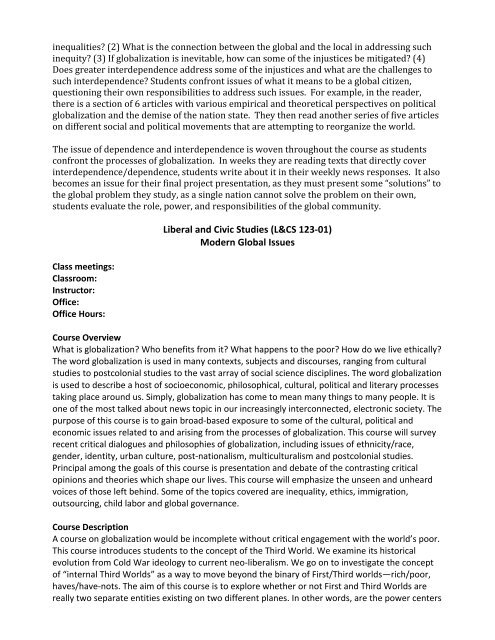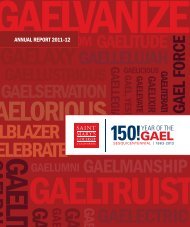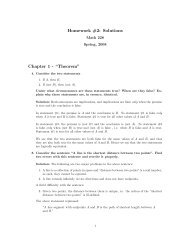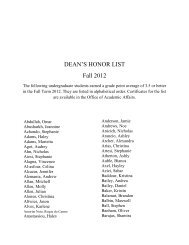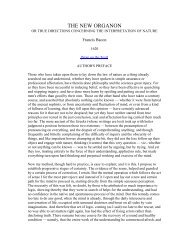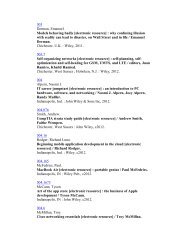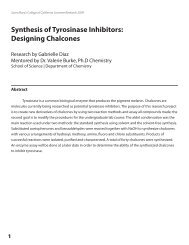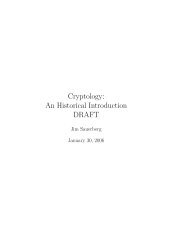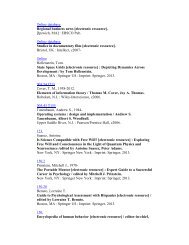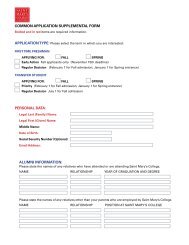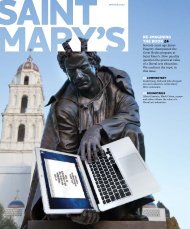Application/Syllabus - Saint Mary's College of California
Application/Syllabus - Saint Mary's College of California
Application/Syllabus - Saint Mary's College of California
You also want an ePaper? Increase the reach of your titles
YUMPU automatically turns print PDFs into web optimized ePapers that Google loves.
inequalities? (2) What is the connection between the global and the local in addressing such inequity? (3) If globalization is inevitable, how can some <strong>of</strong> the injustices be mitigated? (4) Does greater interdependence address some <strong>of</strong> the injustices and what are the challenges to such interdependence? Students confront issues <strong>of</strong> what it means to be a global citizen, questioning their own responsibilities to address such issues. For example, in the reader, there is a section <strong>of</strong> 6 articles with various empirical and theoretical perspectives on political globalization and the demise <strong>of</strong> the nation state. They then read another series <strong>of</strong> five articles on different social and political movements that are attempting to reorganize the world. The issue <strong>of</strong> dependence and interdependence is woven throughout the course as students confront the processes <strong>of</strong> globalization. In weeks they are reading texts that directly cover interdependence/dependence, students write about it in their weekly news responses. It also becomes an issue for their final project presentation, as they must present some “solutions” to the global problem they study, as a single nation cannot solve the problem on their own, students evaluate the role, power, and responsibilities <strong>of</strong> the global community. Class meetings: Classroom: Instructor: Office: Office Hours: Liberal and Civic Studies (L&CS 123-‐01) Modern Global Issues Course Overview What is globalization? Who benefits from it? What happens to the poor? How do we live ethically? The word globalization is used in many contexts, subjects and discourses, ranging from cultural studies to postcolonial studies to the vast array <strong>of</strong> social science disciplines. The word globalization is used to describe a host <strong>of</strong> socioeconomic, philosophical, cultural, political and literary processes taking place around us. Simply, globalization has come to mean many things to many people. It is one <strong>of</strong> the most talked about news topic in our increasingly interconnected, electronic society. The purpose <strong>of</strong> this course is to gain broad-‐based exposure to some <strong>of</strong> the cultural, political and economic issues related to and arising from the processes <strong>of</strong> globalization. This course will survey recent critical dialogues and philosophies <strong>of</strong> globalization, including issues <strong>of</strong> ethnicity/race, gender, identity, urban culture, post-‐nationalism, multiculturalism and postcolonial studies. Principal among the goals <strong>of</strong> this course is presentation and debate <strong>of</strong> the contrasting critical opinions and theories which shape our lives. This course will emphasize the unseen and unheard voices <strong>of</strong> those left behind. Some <strong>of</strong> the topics covered are inequality, ethics, immigration, outsourcing, child labor and global governance. Course Description A course on globalization would be incomplete without critical engagement with the world’s poor. This course introduces students to the concept <strong>of</strong> the Third World. We examine its historical evolution from Cold War ideology to current neo-‐liberalism. We go on to investigate the concept <strong>of</strong> “internal Third Worlds” as a way to move beyond the binary <strong>of</strong> First/Third worlds—rich/poor, haves/have-‐nots. The aim <strong>of</strong> this course is to explore whether or not First and Third Worlds are really two separate entities existing on two different planes. In other words, are the power centers


